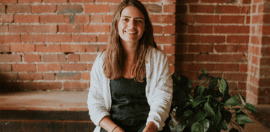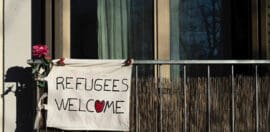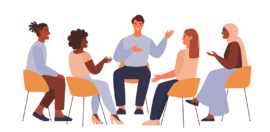“You have no rights”: the refugees left behind

20 March 2023 at 4:10 pm
Pro Bono News speaks to a refugee with nowhere to go after the government’s announcement of permanent visas for some visa holders.
Earlier this year, the federal government announced pathways to permanent residency for certain visa holders.
Those on a Temporary Protection Visa (TPV) and Safe Haven Enterprise Visa (SHEV) who entered Australia before the start of Operation Sovereign Borders received the welcome news that they would be given permanent visas.
But among the fanfare, there were real people who were left behind by the government’s decision — people who still have no hope of being settled in Australia, and who don’t know where they will live in future.
People like Maria*, who spoke to Pro Bono News anonymously about her experience.
No end in sight
Maria has been in community detention for almost seven years.
She and her husband escaped from Iran and made it to Christmas Island in August 2013. After that, they were sent to Nauru, where they remained for nine months.
For medical reasons, Maria was evacuated to the Australian mainland — but that wasn’t the end of her time in detention. Rather than being released to establish her new life, she was transferred between multiple facilities in Brisbane, Darwin and Melbourne for one and a half years.
“‘Horrible’ is not enough words for that,” she said.
“They didn’t release us easily [to] community detention.”
Community detention is a hard life. Living in the community, Maria said she and her family received some “small money” to buy food to eat: $250 a fortnight per adult, and $95 per fortnight for each of her two children.
“Living in these circumstances, you have no rights and you struggle for every single thing,” she said.
She and her family don’t have the right to study. They don’t have the right to work. They aren’t even allowed to stay in a motel overnight.
“If I want to take my kids to a hospital, I should ring [my service provider] and get permission,” she said.
That service provider is Life Without Barriers, which acts as an intermediary and corresponds with the immigration department to let them know that Maria and her family will be in hospital.
Their indefinite detention is harming their mental health.
The reason Maria was evacuated to the mainland was due to her deteriorating mental health, which led her to attempt suicide multiple times. The last attempt was so bad that she was transferred to the camp medical facility, and an emergency jet arrived from Australia that same day to take her to hospital in Brisbane.
Even living within the community, mental ill-health continued to plague the family. At the age of just four months, Maria’s daughter was diagnosed with depression at the Royal Children’s Hospital.
“I’m educated — I have a master’s [degree in environmental science]. Being just stuck at home, it’s another torture for me. It’s 10 years that [I’ve been] under the constant control of immigration,” she said.
“Our bad luck”
Maria, her husband and their children have no visas, and no hope.
She and her family have refugee status, but because they’ve been in Nauru, under Australia’s harsh immigration laws they will never be allowed to settle here. Maria said they have been given an option of resettling in a third country.
And yet, it might not have been that way.
Maria told Pro Bono News that some of those who came in the same boat as her were given SHEVs and TPVs. But immigration officials “randomly” selected some families from each boat to send to Nauru for offshore processing, meaning they will never be settled in Australia.
“It wasn’t our decision, it was our bad luck,” she said.
“And it’s been so random. That was the first level of discrimination, between us and the other people that came at the same time and in the same boat.”
The second level of discrimination, Maria said, was after the family landed in Australia, when they watched as families who had been in detention but whose children had been born here in Australia received TPVs or SHEVs.
“Always, they make some exemption. But we’ve always been out of that. So that’s why we feel that there’s been lots of discrimination about us, and injustice.”
They have formed a community of sorts with other refugees in community detention. She and her husband know other refugees suffering with conditions like PTSD, depression and anxiety stemming from their time in Nauru.
“Some of the people, they still show interest to go to the US or resettle in New Zealand or… Canada, but many of them, they don’t feel that, they don’t feel just trying to start again. And I’m one of those that I don’t feel really like starting again from zero, after being very unwell and now having lots of friends that support me mentally,” Maria said.
Stuck in limbo
Maria stressed that she and her husband would prefer to live in Australia, and be able to work and start their new life here — but with Australia locking them out, and with their depression worsening, they feel they have no choice but to apply for third party resettlement.
She said most of those who she knows in community detention feel the same: as though the choice has been taken away from them. To leave Australia would be to leave the small community they have built around themselves — but there is currently no way for them to stay.
Nevertheless, Maria and her husband have expressed their interest to be resettled in the US. They applied for that more than three years ago; their last interview was held in February 2020, and since then they have heard nothing from the government.
“Our case just stopped. We didn’t get rejected, but we didn’t get any positive as well. So we are still in limbo. I contacted immigration to follow up several times, but they said they don’t know anything.”
She has been told the decision is now in the hands of the US immigration department.
Feeling her fragile mental health beginning to slide again, Maria asked about being resettled in New Zealand instead but was told that as she was already involved in another resettlement process, she couldn’t apply.
“I need to get resettled somewhere. I need to start a life working and then do something for my family,” she said.
“This is not living”
Asked what she would do if she were allowed to stay, Maria’s voice lifts in something like excitement.
She feels confident enough in English to fit into society. She plans to do some “quick study” to complement her master’s and bring her up to speed on the latest developments in her professional field, but her hobby is dog grooming and she feels she could quickly start a business as a dog groomer. Her husband has worked in real estate and could go back to that.
“We can do both immediately, if we get a chance to live in this country… and make our life,” she said.
Pro Bono News understands that around 1,000 refugees in Australia, and 150 offshore, are stuck in Maria’s position and are only able to apply for permanent resettlement in New Zealand, the United States, Canada or other countries.
Maria said she wants the community to know that those on TPVs and SHEVs are no different to refugees in community detention.
“They’ve been in the same boat as us, we just [had] bad luck,” she said.
She said immigration should “correct” the mistake of randomly choosing families like Maria’s to be “punished”.
“They’ve done that to us. They destroyed us. Many people in this group, they’ve done suicide. I could be one of them. I don’t know if I [am] lucky to survive or, I don’t know, maybe it’s my bad luck because this is not living.”
With Australia in a workforce crisis, Maria added that families like hers could contribute to the economy and fill job gaps. She said many are highly skilled, with a desire to add to society.
“To keep them in detention or limbo doesn’t help this country,” she said.
“I still love Australia, however we’ve got lots of injustice and cruelty from the government. But we still receive lots of love from [the community]. Australia has very kind people. I haven’t seen anything bad from [the] people.”
In the meantime, she and her family are still waiting.
Pro Bono News contacted the Department of Home Affairs with a number of questions around the health of refugees being detained, and how the government differentiates between refugees who arrived in the country at different times.
A departmental spokesperson told Pro Bono News the government is “committed to generous and flexible Humanitarian and Settlement Programs that meet Australia’s international protection obligations, and position Australia as a global leader in international resettlement efforts”.
The spokesperson said the department and Australian Border Force are “committed to the welfare” of refugees and asylum seekers detained in Australia’s immigration detention network.
“The Department’s contracted Detention Health Services Provider is responsible for physical and mental health care and support services which are delivered by general practitioners, mental health nurses, psychologists, counsellors and psychiatrists, including those specialising in torture and trauma counselling services. Services are provided through onsite primary and mental health clinics with referral to allied and specialist health providers as required,” the spokesperson said.
“Ongoing mental health screening for detainees is conducted as clinically indicated and is offered according to a routine schedule. Detainees can choose to refuse some or all of the care offered.”
*Maria’s name has been changed.







